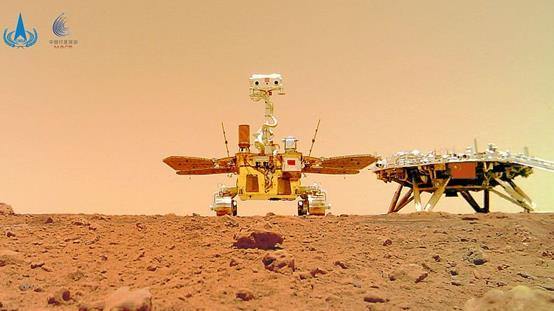
The image taken by a camera released from China's Zhurong Mars rover showing the rover (L) and the landing platform on the surface of Mars, June 11, 2021. (CFP)
A team of Chinese scientists have found possible traces of water activities on Mars, according to a study published in scientific journal Nature.
Their findings are based on data collected from China's first Mars mission, Tianwen-1, during which a rover landed on the surface of the red planet.
The rover, named Zhurong, is equipped with radar that can scan underground materials along its path, as deep as 80 meters.
Though it didn't find direct evidence of water, it did found layers of ground seemingly shaped by water activities dated back around 3.5 to 3.2 billion years ago.
"Previously, it was thought that Mars had kept getting drier, continuing to lose water over the last 3 billion years," Chen Ling, professor at the Institute of Geology and Geophysics under the Chinese Academy of Sciences, told CGTN. "We found that it may not be that simple: in the later time frame, there have been short-intervals of water-based activity; this also explains why our rover's coverage in the south of Utopia Planitia has found so many signs of water."
The water activities might be ancient floods, according to the study.
Chen Ling, professor at the Institute of Geology and Geophysics, introduces the latest findings of Mars at a press briefing in Beijing, China, September 26, 2022. (CMG)
She further explained that the features indicating water activities in Utopia Planitia include impact craters, large polygons and concave cones.
It's still too early to rule out the existence of ice-salt mixture on Mars, the scientists said.
Chen's team had only used Zhurong Rover's data sent back from the first 113 Martian days and first 1,171 meters it traveled, but these have been data gathered at unprecedented levels.
"This is the first time for any of us to see such a layered structure for Mars underground," Chen said. "I don't think anyone has seen it before us, for the simple reason that this is the highest-resolution, 80-meter deep, rover-radar data anyone has ever had."
The Tianwen-1 probe touched down at its pre-selected landing area on May 15, 2021. With all the data rolling in, the team says they could unlock more knowledge in the future.
"Our next questions are: Is there water in places deeper than 80 meters beneath the surface? If so, how has water affected the climate? Moreover, we can learn more about the Martian surface, the crust, the spectrums in between as well as their water content," Chen said.
As of September 15, the Tianwen-1 Mars probe had completed all its tasks and acquired almost 1,480 gigabytes of raw scientific data.
Editor: Fan Chenyu




